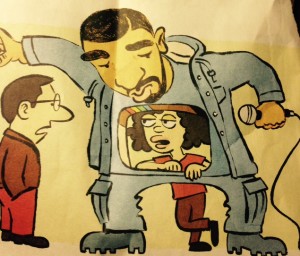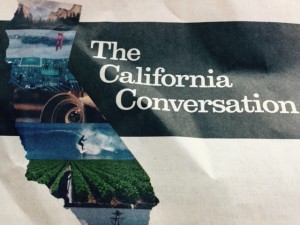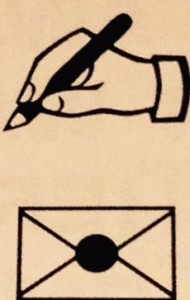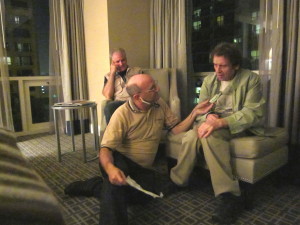As more and more of our relationships play out over social media, with political squabbles passing for conversation and emojis standing in for genuine expressions of affection…
Meghan Daum, LA Times February 18 2016 on how Justices Scalia and Ginsberg could share common joys despite their political differences
People yearn to elevate the “national” conversation. When a culture like ours lacks decent political dialogue, comedians act as our philosophers and guides. We turn to Samantha Bee and John Oliver.
I do, for guidance.
Meanwhile, do you think texting has helped the national conversation?
I don’t. When you don’t have to face a convo-correspondent, you can grind them down and out by turning a give-and-take into a rugby grunt. It’s so easy to push and shove aint it? But screaming angry and lost is not a conversation.
Political conversation can be enlightening. Despite what you may take from current debates. And the best way to join a national convo? Start one. Locally. Here’s an example:
In August of 1968, I was sitting on the floor of our “family room” in Detroit watching the Democratic convention being broadcast on NBC. (My parents liked Cronkite, but Huntley-Brinkley were great covering conventions.) Suddenly there on our 19-inch Magnavox were policemen in Chicago swinging billy clubs at protestors, knocking them into dark streets.
I turned to my father sitting behind me. My father always watched TV shows from the sofa with the evening’s Detroit News on his lap.
“Dad?”
“Yes?”
“Why are the cops beating up those students?”
My father folded the newspaper on his lap. The continuing mayhem kept flowing right there in front of us in uncut black-and-white news footage, and he seemed at a loss.
“I don’t know, son,” he said.
“I don’t get it,” said the 13 year-old son.
“I don’t understand that, either,” said the dad.
And this is when I first learned to – the phrase was already popular on protest buttons —“question authority.”
Because guess what? Authority did not have all the answers. Sometimes authority didn’t know what was going on. It was time for me to join the national conversation. (Ask your grandparents for more details.)

Back Pocket Banter
Perhaps some folk journalism seeds were planted during that 1968 Democratic convention. I remember seeing NBC News reporter Sander Vanocur brandishing his microphone like a weapon, flashing past competing convention floor reporters from ABC and CBS, adjusting the antenna on his portable headset—made him look like My Favorite Martian — and shouting: “Buzz off guys, this is my interview!”
Questions
What do you think of our current discourse?
Do you ever write letters to a newspaper or call a radio talk show? What about?
A popular button worn during the revolutionary days of the 1960s said: “Question Authority.”* Do you ever question authority? What kind of response did you get?
Cultural Convo
Write a short thank you letter to a public figure who has had a positive influence on you.
Shoot an email to a local, statewide or national politician about something they said. See what kind of response you get and tell others about it.
Join “the national conversation” online or on a street corner. Annotate, annoy, amuse and inform others. With verses of your own devising, drive eyeballs open 24/7. “Write your ream or only dream.” Go ahead and pull a leg pull a face pull a prank. Kesey and the Merry Pranksters of the 1960s defined a prank as, “Something never been seen before: You bomb them, but you do it at night, with poetry.”
America is talkin’. It is this conversation that I find fascinating and vital. It is who we are – a highly opinionated, multimillion-voiced choir with Internet access. I think the anonymity allows people to honestly state what’s on their mind. The ugly Americans and all the rest come out to play.
Henry Rollins in The LA Weekly February 2014
In the mixed-up scrum of politics and media that our so-called national conversation has become….[it’s] a roiling cauldron of outside observers, all bent on ‘bearing witness’ to the situation.
Mark Leibovich, “Let Us All Bear Witness To The Conversation!” NY Times Sunday Magazine September 2014
http://www.nytimes.com/2014/09/07/magazine/bearing-witness-in-ferguson.html
* John Mellencamp’s “Authority Song”
http://www.lyricsfreak.com/j/john+mellencamp/authority+song_20074552.html


